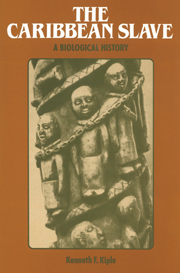Book contents
- Frontmatter
- Contents
- List of Tables
- Preface
- Acknowledgments
- Part I Background and Biology
- Part II Diet, Disease, and Demography
- Introduction
- 4 The Middle Passage and Malnutrition
- 5 Plantation Nutrition
- 6 Malnutrition: Morbidity and Mortality
- 7 Slave Demography
- 8 Slave Infant and Child Mortality
- 9 Black Diseases and White Medicine
- Part III Pathogens and Politics
- Notes
- Bibliographic Essay
- Index
5 - Plantation Nutrition
Published online by Cambridge University Press: 19 October 2009
- Frontmatter
- Contents
- List of Tables
- Preface
- Acknowledgments
- Part I Background and Biology
- Part II Diet, Disease, and Demography
- Introduction
- 4 The Middle Passage and Malnutrition
- 5 Plantation Nutrition
- 6 Malnutrition: Morbidity and Mortality
- 7 Slave Demography
- 8 Slave Infant and Child Mortality
- 9 Black Diseases and White Medicine
- Part III Pathogens and Politics
- Notes
- Bibliographic Essay
- Index
Summary
The plantation, as a segmented social microcosm, may be regarded as the dominant social and economic unit of the Caribbean.
H. Hoetink (1967)Precise knowledge of what happens to the food entering the organism must be the subject of ideal physiology, the physiology of the future.
I.P. Pavlov (1904)Food reached slave cooking pots in the basic ways discussed in Chapter 4. Only in fringe areas of Caribbean slavery such as the Bahamas did slaves have the free time to fish or raise animals and thus add complete protein to the yams, taro, plantains, and perhaps corn or millet that they grew. That this was the best method nutritionally seems confirmed by height data, which showed Bahamian slaves to be among the tallest in the Caribbean.
At the opposite extreme, slaves were expected to feed themselves without receiving much in the way of free time to do so. Presumably planters stood ready with emergency rations in case of real shortages of slave-grown provisions occasioned by physical or political disasters. But generally the slave diet was a product of their own efforts and consequently was almost totally vegetable in nature, containing little or no animal protein. This diet seems characteristic of many Cuban plantations as well as those of Trinidad and Guiana, which produced the shortest Creole-born slaves–all regions where intense sugar slavery was a fairly recent phenomenon during the early nineteenth century when the height data were amassed.
- Type
- Chapter
- Information
- The Caribbean SlaveA Biological History, pp. 76 - 88Publisher: Cambridge University PressPrint publication year: 1985



